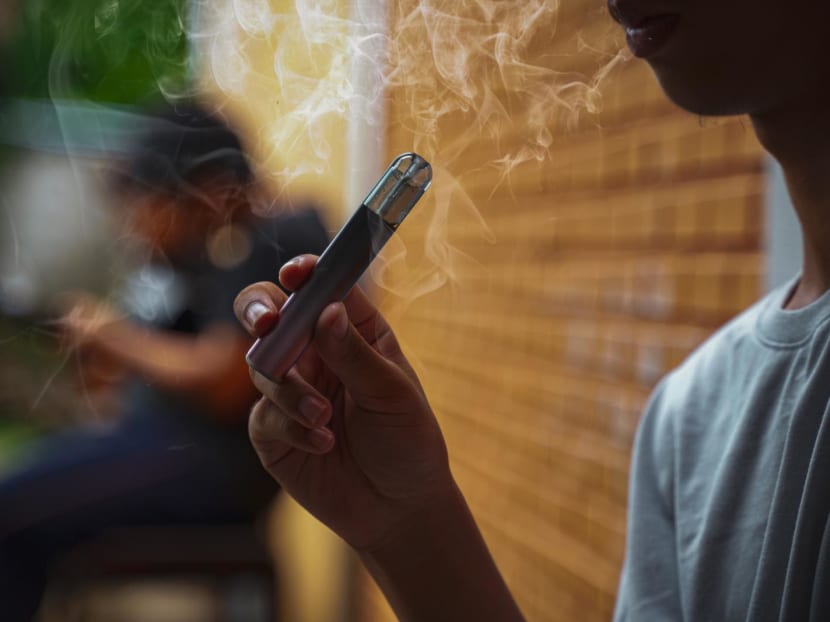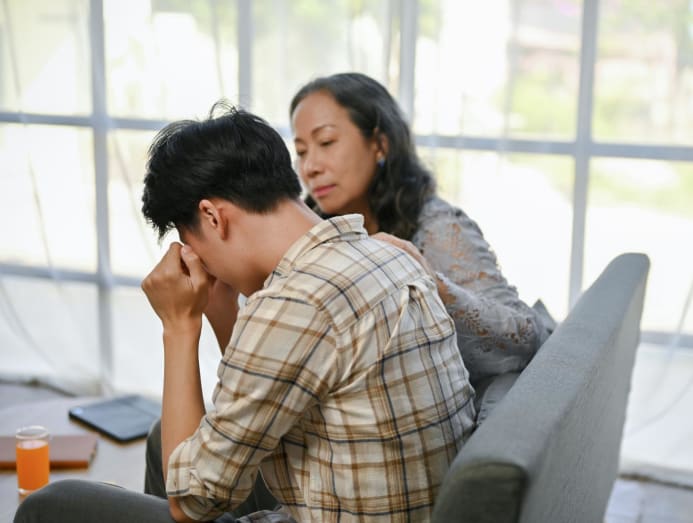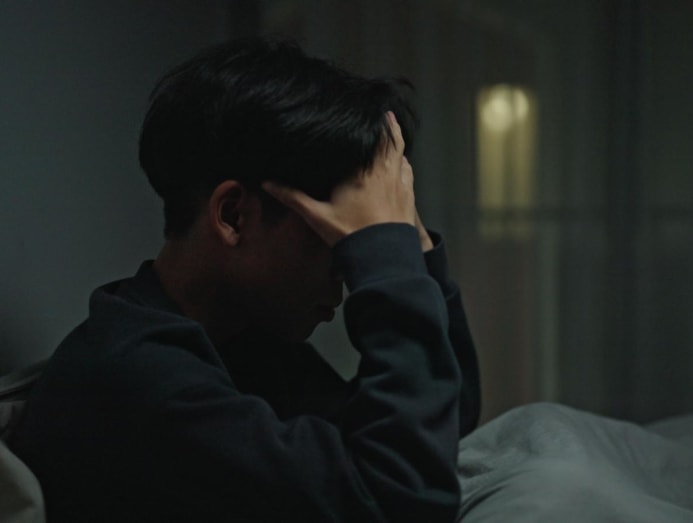'We are punishing ourselves': The mounting toll of teen Kpod addiction on desperate parents
At their wits' end, parents of Kpod-hooked youths are calling for harsher punishments for device sellers and a specialised rehabilitation centre for teenagers.

In his National Day Rally speech on Aug 17, Prime Minister Lawrence Wong said the government will be toughening its stance on e-cigarettes. But parents of Kpod-addicted teens are wary of hoping for too much just yet. (Photo: iStock)

This audio is generated by an AI tool.
Ms Tang hasn't slept properly in close to eight months. Once, she stayed up for nearly 36 hours straight, keeping vigil over her 18-year-old son.
She was too afraid that the moment she closed her eyes, he would slip out of the house to chase another hit from Kpods.
Most nights, when the young man heads out to hunt for these e-vaporisers laced with the fast-acting anaesthetic etomidate, he leaves the front gate wide open. These expeditions also set off a blitz of motion alerts on Ms Tang's phone, from the closed-circuit television cameras around their home.
Ms Tang, who declined to give her full name, started noticing her son was acting "a bit weird" last Christmas Eve. It wasn't until a few months later, just shy of Chinese New Year, that she caught him red-handed with Kpods.
He denied it at first. "But obviously, I can tell that he's on drugs," she said.
When her son is using Kpods, Ms Tang said he is "not in a conscious state". Unaware of his surroundings, he often loses his bearings and stumbles into furniture, often resulting in serious injuries.
When her son comes down from a Kpod-induced high and is lucid, he appears to be remorseful over his actions – but she knows his words are "all lies".
"He's remorseful for a few hours, and then later at night, he starts again," she said.
"It's really a mental torture."
A few weeks ago, exhausted and unable to cope, Ms Tang handed her son over to her ex-husband, who lives separately from her. She hoped a change of environment might help.
But the relief was short-lived. One night, under his father's watch, her son collapsed while high and crashed into the toilet door, an acrylic bifold that shattered on impact.
"He broke the whole door," said Ms Tang. "It was so sharp. If he had fallen just a bit differently, the shards could have gone straight into his neck or his head."
"I'm going to lose him like that, even if I don't lose him (to Kpods). I think I'll go mad."

Ms Tang is at the end of her rope. She has tried berating her son, screaming at him, and even sitting him down to beg him to try and make a fresh start.
"I told him: 'Let's just start over. I'll forget everything if you stop'," she said.
Hoping to redirect his focus in positive ways, she bought him a turntable he'd been eyeing and took him to cafes to talk, connect and keep him grounded. However, when CNA TODAY spoke to Ms Tang earlier this week, she said her son was still on Kpods.
Given the emotional pain Ms Tang has endured, Prime Minister Lawrence Wong's announcement to treat vaping as a "drug issue" and ramp up enforcement couldn't have come soon enough for her – and for many other parents caught in the same helpless cycle.
In his National Day Rally speech, Mr Wong said the government will be toughening its stance on electronic cigarettes and imposing "much stiffer" penalties, including jail sentences and more severe punishments for those who sell vapes containing harmful substances.
"So far we've treated vaping like tobacco – at most we impose a fine. But that's no longer enough," said Mr Wong on Aug 17 at the Institute of Technical Education College headquarters in Ang Mo Kio.
He added that the Ministry of Home Affairs and Ministry of Health are set to mount a large-scale public education drive, starting in schools, institutes of higher learning and during National Service.
At this point in her son's battle with his addiction, Ms Tang is wary about hoping for too much. Instead, she's taking a wait-and-see approach to the prime minister's announcement.
"There's been so much talk, but I haven't seen anything actually put in place for parents like us," she said.
For instance, she pointed to the fact that Kpods are still "very accessible", adding that she only has to step out of her housing block to find people openly peddling Kpods.
One measure that might give Ms Tang immediate relief is a rehabilitation programme for teenagers who are addicted to Kpods. Even so, other concerns come to mind for her, especially considering the young age of such offenders.
"If you put them in a drug rehabilitation centre, won't they end up mixing with even more 'hardcore' drug users? Is that really good for them?" she asked.
"What happens when they come out?"
"WE WERE VERY CLOSE"
Mr Marco Yeo, a father of three, knows too well the helplessness Ms Tang is describing. To the 43-year-old, who works in operations, the tougher stance outlined by PM Wong is a necessary step in tackling what he sees as now a national threat.
But for parents like Mr Yeo and Ms Tang, the issue is far starker than a change in policy. It is a daily battle.
Attempts to manage their children's addiction have proved futile and only strained trust in their relationships, with siblings often caught in the crossfire. The worst of it all is the constant anxiety that the next high could end in tragedy.
Mr Yeo first discovered his 14-year-old son abusing Kpods two years ago, and the warning signs were not what he might have expected.
It was his son's sudden outpouring of emotions and saying things like "Daddy, I love you" that initially made him suspicious.
But with addiction, unpredictability tends to define life at home, and outbursts can quickly swing from these tender confessions to dangerous extremes.
In one harrowing incident, after having his e-vaporiser taken away, Mr Yeo's son held a knife to his own neck, threatening to harm himself if his device was not returned to him.
"There are instances where he says things like 'I'm better off dead' and wants to jump off a building," said Mr Yeo.
Using Kpods has also affected his son's performance in school. The 14-year-old has played truant and even once got a tattoo while high. Upon discovery of the tattoo, the school suspended him and he was unable to return until the tattoo was removed, which took around six months.
The school also asked Mr Yeo to take his son home after classes are let out each afternoon, a safeguard aimed at preventing unmonitored behaviour. But such requirements are hardly realistic.
"I work at Choa Chu Kang (in the west). The school is located in the north-east region. How do you expect me to fetch him every afternoon?" he said.
"They then asked me to arrange for private-hire vehicles to pick him up. If I don't comply, it is insinuated that I'm not cooperating."
Parents told CNA TODAY that measures like these, while well-intentioned, do little to address the issue in the long run and point to a larger gap. Without additional systemic support, responsibility for helping and managing Kpod-addicted teens falls almost entirely on them, many of whom are already stretched thin.
In addition to being ill-equipped to deal with his son's addiction, Mr Yeo laments the great impact it has had on the family.
Before his son got hooked on Kpods, the family was tight-knit. Nights were spent together walking the dog or going to the supermarket.
Now, the atmosphere at home is more guarded, especially after an incident where his son stole from his wife to fund his Kpod habit.
Mr Yeo and his wife make it a point to remind their 22-year-old daughter to lock her door before leaving the house. Their son now spends most of his time at home sequestered in his room.
In Mr Yeo's view, his son's addiction hasn't just eroded shared feelings of happiness and joyfulness among the family. It has also taken a toll on the relationship he has with his son.
"It's not like before," he said. "But we can only slowly build it back up."
THE MENTAL AND EMOTIONAL DAMAGE TO FAMILIES
For other parents, the fallout can be even more immediate and severe.
One mother, Jane (not her real name), described how her now 19-year-old son's addiction to Kpods escalated from self-harm to harming those around him.
"He beat up his brother and even threatened to beat up me and my husband, saying that we don't love or trust him," said the 44-year-old administrative worker.
The threats were translated into action, as he was "very aggressive and angry" on Kpods and used knives to cut himself such as on his face and stomach. Sometimes, he would do so in front of his parents, or even on social media livestreams.
Jane's eldest son, 21, struggled to accept what was happening at home, calling his brother a "druggie". Once, a confrontation between the brothers turned physical and left the living room covered in blood.
Before Kpods came into the picture, Jane recalled being "very close" to her son. "He would tell me everything, and we always went out together," she said.
After his use of Kpods began, however, her son became reclusive. He withdrew from her and mostly stayed home.
This change was also noticed by his friends from a lion dance troupe he is a member of, whose pleas for him to return to the troupe were ignored.

Another affected parent who wished to be known only as Elizabeth welcomed PM Wong's announcement as a step in the right direction but, like Ms Tang, is still waiting to see what concrete action will follow.
The 55-year-old administrator said her son had been using Kpods, but stopped after a close friend died in a Kpod-related incident.
Elizabeth said her son, aged 14, is currently not using Kpods and is trying to quit his reliance on all vapes. She's thankful that he's now turned the corner, but she knows she's one of the lucky ones.
"A lot of parents are struggling," said Elizabeth. "You go to one place for help, and they push you to another.
"In the end, no one is actually helping you."
"MA'AM, I'M SORRY"
Etomidate, the key substance in Kpods, is an anaesthetic which can be dangerous when used outside a controlled medical environment.
It is currently not classified as a controlled drug. Under existing laws, users of drug-laced pods may face fines but not arrest or mandatory rehabilitation.
As such, when parents call upon law enforcement, agencies often have their hands tied.
In July 2025, the Ministry of Health announced plans to reclassify etomidate as a Class C controlled drug under the Misuse of Drugs Act (MDA).
When that comes into effect, users can be placed under supervision, required to undergo mandatory rehabilitation, or committed to a drug rehabilitation centre. Repeat offenders may face prosecution and a minimum jail term of one year.
Vapes, or e‑vaporisers, are currently banned in Singapore and regulated under the Tobacco (Control of Advertisements and Sale) Act.
Distributing, importing or selling prohibited tobacco products – including vapes and their components – carries a heavier penalty: a fine of up to S$10,000, up to six months' jail or both.
The increased use of vapes among youth is now a growing national concern, with 2,000 cases of students reported for possessing or using e-vaporisers in 2024. This is a significant jump from the 900 cases reported in 2023.
Kpods appeal to youth in particular because they are so quickly and easily accessible, said Associate Professor Sewa Duu Wen from the Department of Respiratory and Critical Care Medicine at Singapore General Hospital. It's also difficult to track transactions for these devices on encrypted platforms such as Telegram.
Other draw factors include social influence, misconceptions that vaping is safer than traditional smoking, and the ease of concealment, said Dr Sewa.
Parents told CNA TODAY that because the new laws have yet to take effect, their repeated calls to the police, Health Sciences Authority (HSA), Central Narcotics Bureau (CNB), and the National Addictions Management Service (NAMS) have often led nowhere.
Jane remembers first calling the CNB only to be redirected to the HSA, as etomidate was not classified as a controlled drug under legislation enforced by the CNB.
She contacted HSA, but they could only issue a fine, which the family ultimately had to bear.
Mr Yeo faced a similar situation when he tried to call the police to attend to his son during a particularly bad episode where an ambulance also had to be called.
"I'm calling the police to fine myself. The hospitalisation bill and everything else will be charged to me," he said.
"We want to stop him from abusing this substance, but it seems that we are punishing ourselves."
In August 2025, the Ministry of Health and HSA said in a joint statement that they are stepping up enforcement actions against etomidate-laced e-vaporiser offences.
This follows a July 2025 statement by HSA that offenders found to be dealing with or in possession of e-vaporisers with etomidate will face higher penalties under the Poisons Act. Under the Poisons Act, those found guilty of possessing, importing or selling pods containing etomidate face a jail term of up to two years and a maximum fine of S$10,000.
Elizabeth said that when parents like her end up paying the fines, it sends the wrong message as teenagers feel there are no real consequences, which only encourages them to keep using Kpods.
Throughout Ms Tang's seven months of grappling with the worst of her son's addiction, a constant refrain she heard from the police and other authorities was "Ma'am, I'm sorry".
"Even when they come to my house or when I bring him to the police station myself and report everything, all I get is 'I'm sorry, ma'am, there's nothing we can do'," she said.
With the accessibility of Kpods, parents are calling for stricter penalties for sellers to help eliminate their supply in Singapore.
Alongside more vigorous law enforcement, they're also entreating for more structured avenues to provide their children with the help they need. For instance, Ms Tang hopes a specialised rehabilitation centre for teenagers hooked on Kpods can be set up.
However, it's not just a matter of applying typical cessation strategies. Dr Chee Tji Tjian from the Department of Psychological Medicine at National University Hospital said that a unique set of challenges arises when it comes to helping young people quit Kpods.
Alongside a lack of awareness among parents, structured treatment protocols also lag behind the fast-changing landscape of youth vaping.
"Engaging adolescents in treatment can also be challenging if teens feel their autonomy is not respected or trust has not been established," said Dr Chee.
NEED TO ADDRESS ROOT CAUSE
Singapore's tough anti-drug stance has been decades in the making but vaping, and now Kpods, represent a newer, fast-spreading challenge that's proving harder to control.
Senior law lecturer Olivine Lin from the Singapore University of Social Sciences (SUSS) said that because vaping is already being used as a way to take illegal substances, the upcoming reclassification of Kpods under drug laws makes sense.
Just as Singapore bans drug tools like pipes and syringes, she explained, it also makes sense to ban vapes and vape parts. Even if a vape contains only nicotine, banning the act of vaping helps prevent future drug abuse.
Sounds good in theory, but will it amount to any real change?
"The fact is that with or without a ban, there will always be a segment of the population who, for one reason or another, will go on to flout the law," said Ms Lin.
Agreeing, Associate Professor Razwana Begum, head of the Public Safety and Security Programme at SUSS, said since vaping is the subject of a widespread ban, reclassifying Kpods as drugs may not be enough to shift individuals' behaviour.
Instead, enforcement must become more visible and consistent.
At the same time, she cautioned that criminalising minors risks creating a "deviant identity" – that is, categorising and treating them as a person who flouts the rules from such a young age is likely to result in them self-identifying more strongly as such a person. This, in turn, heightens the possibility of repeat or long-term offending.
Singapore must take a nuanced approach and create concurrent pathways for tackling Kpod addiction that emphasise diversion, counselling and parental involvement.
This will be more effective in the long run, as severe punishment alone can backfire, said Assoc Prof Razwana.
She noted that Singapore encountered similar resistance to the e-scooter ban in 2019, which led to widespread non-compliance. However, the authorities managed to address this by combining consistent enforcement with trade-in schemes and public messaging.
This showed how the law is most effective when paired with practical alternatives and visible norm-setting, not just penalties, said Assoc Prof Razwana.
Ms Lin expects the fight against vaping to be long and drawn-out, as it was with drugs. "As with all social policy, it would be unreasonable to expect that vaping will suddenly become unpopular overnight or that mindsets will immediately change."
However, she hopes it will gather momentum as the public message is continually reinforced.
Assoc Prof Razwana said that the current wave of Kpod addiction should not be mistaken for an issue of young people "lacking self-control or discipline". She cited the National Youth Mental Health Study's findings that a third of young Singaporeans aged 15 to 35 years old experience severe or extremely severe depression, anxiety or stress.
"It is not simply about willpower in children and young people. It also reflects stress, accessibility and social influences in a digital age," she said.
"Unless we address these underlying causes, we risk shifting from one harmful trend to another."
"MY SON IS BACK"
When it comes to interacting with children and teens hooked on Kpods, empathy is key.
"Parents can create a safe space to share openly about their struggles, which may be driving their behaviour," said NUH's Dr Chee.
While initial resistance is common, youths can eventually start to respond positively.
Feeling lost and frustrated during the ordeal over her son's addiction, Elizabeth and her husband eventually reached out to a psychotherapist, Mr Gopal Mahey.
"Youths often describe feeling 'trapped' by their dependency and express a desire for change, but fear hinders them from seeking help," said Mr Mahey.
"Once that fear is addressed and trust is established, most are relieved that someone is finally taking their struggle seriously."
Currently, drug rehabilitation centres such as Addictions Recovery provide services such as counselling, home-visit youth intervention, relapse prevention planning and family support groups.
"My son is a good boy," said Elizabeth. "I think he will learn from there (recovery and counselling services) and seek help … where they can direct him to a better path."
When CNA TODAY spoke to Jane on Aug 19, her son was undergoing rehabilitation at the Reformative Training Centre (RTC).
Following his involvement in a separate case unrelated to substance abuse when he was 15 years old, the authorities told Jane there was a high likelihood of her son getting off with probation.
However, Jane pleaded with the investigation officer to admit him to the RTC instead. "If he's locked up, maybe he can quit," she said.
During her first visit to RTC three weeks after his admission, Jane cried upon seeing the improvements in his physical appearance.
"He looked stronger and healthier," she said. "I saw that my son is back."
Alongside rebuilding the bond with their child, Elizabeth and her husband are now also seeking counselling for themselves, after being encouraged by Mr Mahey to do so.
Now, she understands the need for parents dealing with Kpods-addicted teens to look after their own well-being too.
"I hope that parents can seek help for themselves first, and then help their kids," she said.















